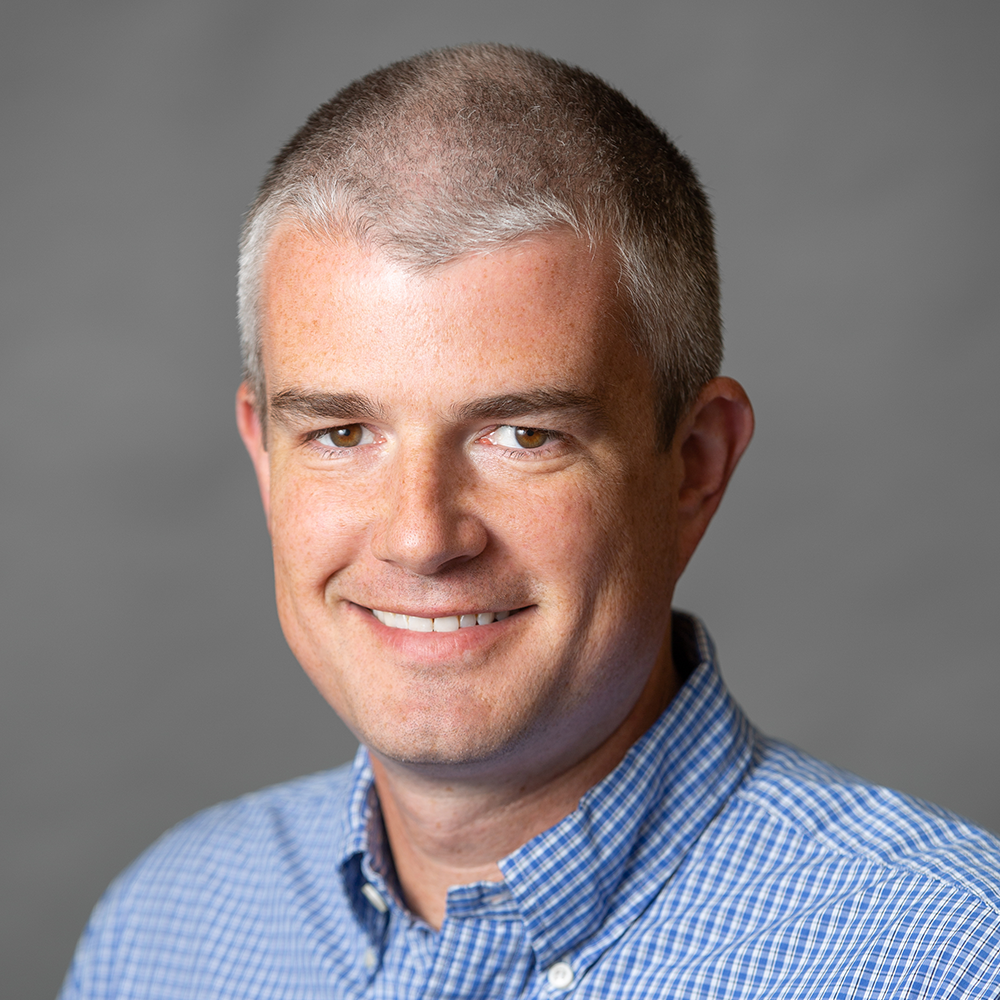by: Emily Adelman
How HudsonAlpha is capitalizing on the Alabama Governor’s Office of Minority Affairs HBCU Co-op Program while helping students discover their potential in genetics and genomics
A section leader for the mellophones for the Marching Maroon and White. A chemistry major proving to everyone that she belongs in the field. Miss Oakwood University. A soon-to-be-graduate figuring out exactly what she is meant to do in this world. All working at the HudsonAlpha Institute for Biotechnology through the Alabama Governor’s Office of Minority Affairs HBCU Co-op Program. All making a difference for themselves and the field of genetics and genomics.
The program is a three-way partnership between the Alabama Governor’s Office of Minority Affairs (GOMA), HudsonAlpha, and Alabama’s 14 historically Black colleges and universities. HudsonAlpha Director of Diversity, Equity and Inclusion, Darrell Ezell, PhD, says the program provides a year-long opportunity for students to “gain mentorship under some of the finest scientists and instructors in the area of genomics.”
We want to introduce you to these students and how their experiences at HudsonAlpha through this program are shaping their future and the future of genetics and genomics research as a whole.
You never know until you try
Joshua Stanley, Senior Biology major, Alabama A&M University
Joshua Stanley did not know he wanted to study plants. “I chose to be a biology major and wanted to go on the physical therapy track.” Plant science was not even on his radar until an enthusiastic botany professor changed his career outlook. “I thought, ‘why is she so interested in plants? What is it about plants?’ So I started to research and watch Youtube videos and began to really like it. I took a genetics course and enjoyed that too, so I mixed the two.”
Joshua started with HudsonAlpha in February of 2021, interning in Dr. Kankshitha Swaminathan’s lab two days a week, in between classes and band practice. He is a section leader for the mellophones for the Marching Maroon and White at Alabama A&M University.
In fact, it was an interaction with Dr. Swaminathan and a push from some friends during his freshman year of college that led him to her lab on the fourth floor of HudsonAlpha. “My genetics teacher invited Dr. Swaminathan to talk about the GOMA Co-op program. As soon as we heard about it, my friends who were in the same class texted me: ‘Josh this is your chance! Plant Genomics is what you wanted to do.’ So I jumped on the opportunity.”
Landing firmly on his feet in Dr. Swaminathan’s lab, Joshua spends his days in the lab doing various things, from submitting grant proposals to helping senior scientists and lab associates with DNA and RNA extraction. He says this level of exposure and hands-on learning wouldn’t have been possible without the Institute.
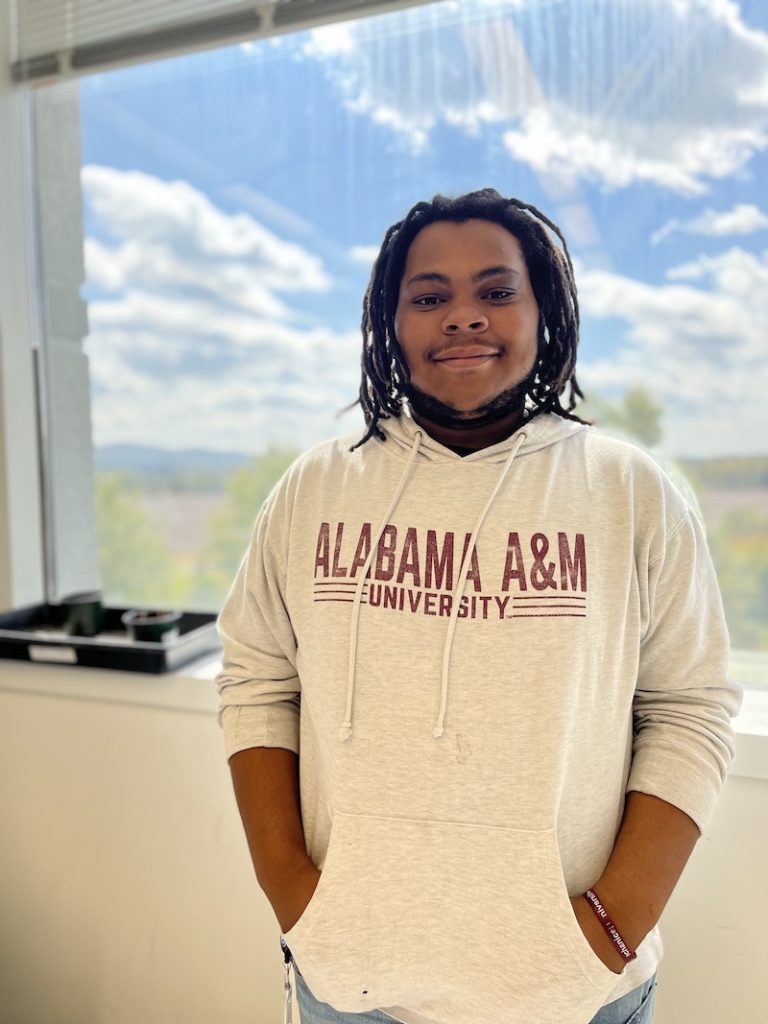
The HBCU GOMA Co-op Program exposes students who may not have the opportunity or knowledge of certain jobs or skills to different careers and paths. Joshua is no different. “This program exposed me to a whole new variety of jobs, careers, and fields I can pursue and different types of science that I didn’t know about at first. In my community, it’s taught that you should be a doctor, a lawyer, or engineer. Nobody ever said, “go be an agro-science major or work in crops.”
It is a perfect example of why programs like GOMA at HudsonAlpha are essential. “Opening up the door and showing students the different paths they can take, and having them figure it out, is the best way to do that,” Dr. Ezell added.
As for Joshua, his time at HudsonAlpha, in the agriscience field, and the HBCU GOMA Co-op program helped him decide his next move. If he can’t spend all his time playing the mellophone, “I want to get my master’s in plant science at A&M. They have a great agriculture program.”
Just go for it
Jherni Fisher, Junior Chemistry major, Alabama A&M University
Jherni Fisher does not take kindly to being underestimated, especially when it comes to her future. “In high school, when I was trying to decide between chemistry and physical science, people kept telling me to do physical science because chemistry is ‘too hard’, it’s too rigorous,’” Jherni said. That unsolicited advice turned out to be the best form of motivation for the young woman from Mississippi. “It made me want to choose chemistry to prove them wrong. It worked out because I have fallen in love with chemistry ever since then.”
Jherni took that interest all the way to college, where she is now a junior chemistry major at Alabama A&M University, with a particular focus on diseases and their impact. She interns with Sara Cooper, PhD, in her lab two to three times a week, learning more about breast and ovarian cancer research. “Figuring out what traits are associated with people and helping them understand it and find treatment and cures for it,” Jherni explained, “I wanted to learn more about that and am going to see how that goes.”
So far, it is going pretty well. “I’ve already learned so much,” Jherni said. “I am learning about research, what it entails and what goes into it. It’s very insightful.” Jherni says the internship is helping her decide what career path she wants to take.
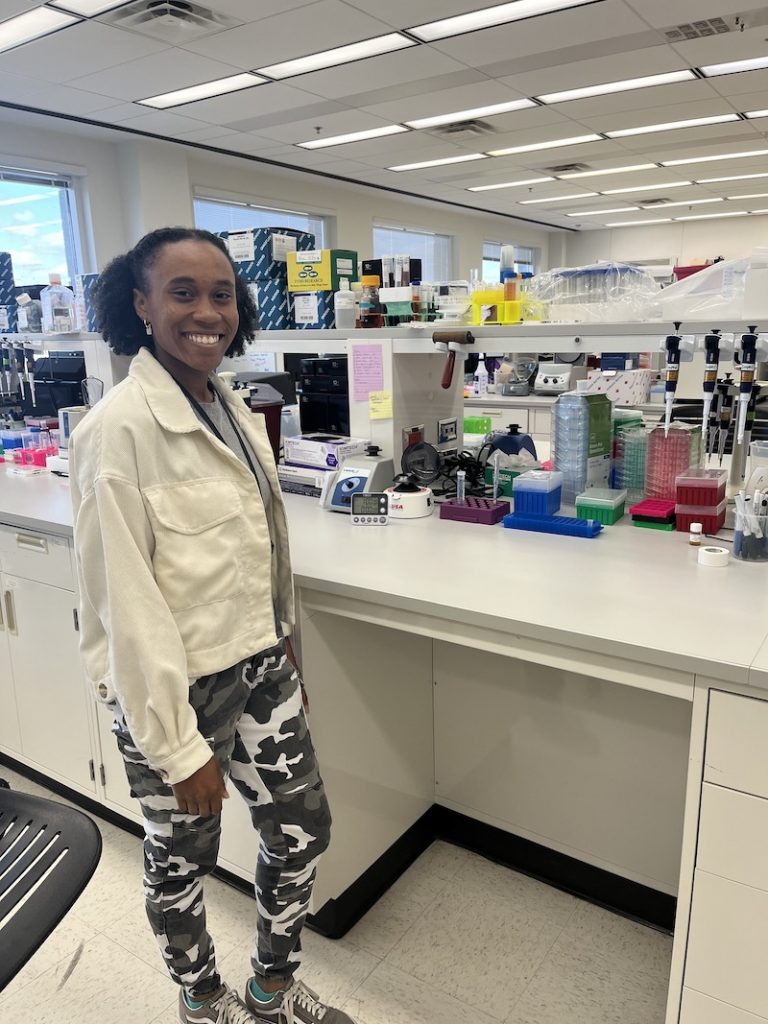
She credits the GOMA Co-op program for her success so far. “With GOMA reaching out to these different HBCUs, it gave me more of an opportunity to get insight into working in a research institution. I don’t know where else I could have done this,” Jherni explained. That is a key part of the program, according to Dr. Ezell. “Providing opportunities to HBCU students is so essential,” he said. It helps students realize there are many paths they can take when it comes to genetics and genomics and that they can find success in the field. “I think it’s very important for people of color to work in STEM and work in the lab because it shows them that you can do it.”
When Jherni was asked about future students who get this opportunity, she had one piece of advice. “Just go for it. If you want to learn more about science, or you’re just curious about certain things, just go for it. People may try and sway you and say, “oh, it’s super challenging,” or “oh, it’s a lot of schools,” but if that is what you truly want to do and it’s your passion, then it will work out in the end.”
Confidence is Key
Raven Allen, senior biology and pre-med major, Alabama A&M University
Raven Allen loves working with students. “It’s my all-time favorite thing to do,” she says. But, like many college students, she was torn on what she wanted to do in life. “I wanted to be a teacher, but also took a business course that I really liked. I was also into medicine as well, and that stuck, so I decided to major in biology.” So, when an opportunity to intern with HudsonAlpha’s Educational Outreach program arose, she jumped on the opportunity but was convinced she was not getting the spot.
“I was nervous about applying. I know I was not the only one to apply, and I had that doubt in my mind like, ‘how can I go up against all these people’.” But sure enough, she was one of four students selected for the GOMA Co-op program at HudsonAlpha. “It was a very important moment for me. I couldn’t believe I was the one who got picked out of all the people applying,” Raven said.
The soft-spoken senior from Alabama A&M spends her day as a text subject for some of the Educational Outreach instructors. She helps the instructors reteach information about high school biology and genetics while also picking up a few things for herself. “I am doing a lot of relearning here at a higher capacity,” Raven explained. “I love it. It expanded my mind. Even pipetting, something about having a steady hand, I feel like I’ve gotten much better at here.” Raven is also able to learn new things. “I am doing case studies on abnormalities, so I do a lot of writing and research and things like that.” She said having that real-world experience is important, especially because, until this program, she did not know it was possible in a STEM setting.
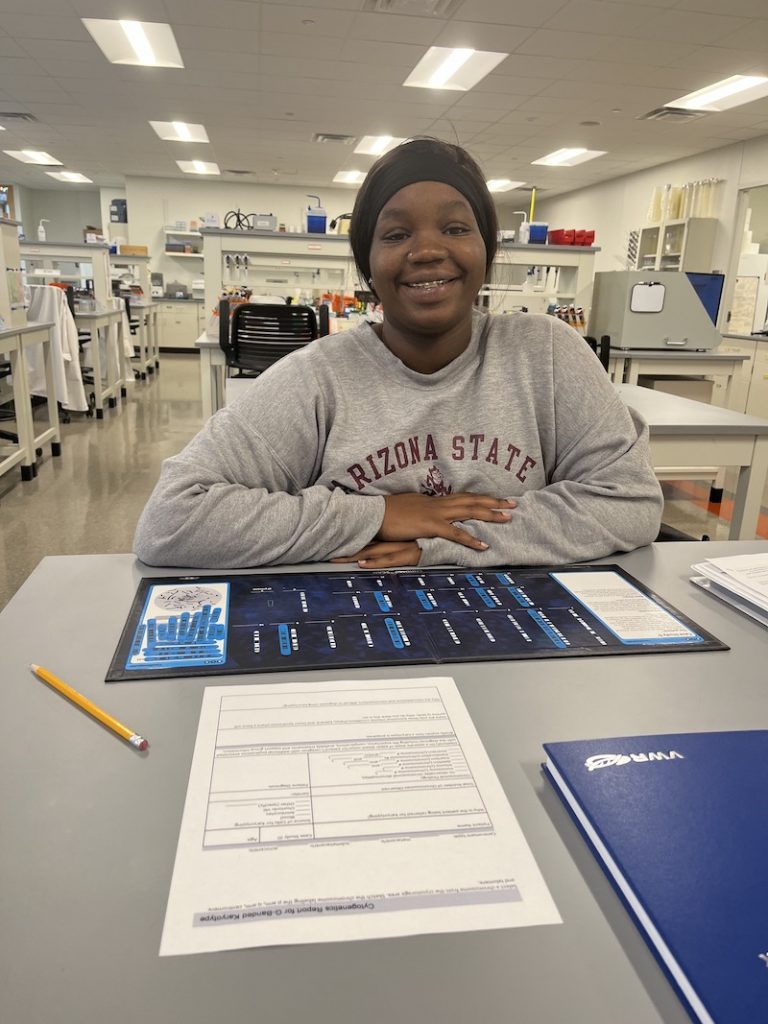
“Growing up, I did not have a lot of representation of what I look like in this setting. I feel like it is important that they started this program because we don’t get these types of opportunities just off the strength of just applying,” Raven said. “We need these avenues to get to where we want to be. I feel like this helped me a lot. I would have never had this opportunity without GOMA.”
It is possible, and the GOMA Co-op program allows students to change and enact a learning curve themselves, helping them become the next generation of diverse STEM leaders and scientists. “It’s great to see HudsonAlpha is committed to not only diversity but also providing a bridge from the HBCU to various scientific fields and preparing students for the future,” Dr. Ezell said.
Raven is one of many students taking advantage of that opportunity, and it is not only helping her in a professional setting, but a personal one too.
“Now I have confidence in a professional workplace. I can put my foot forward and keep learning. There is always a way to learn something new. You can be as big as you want to be and learn as much as you want to learn if you just try your best.”
Making an Impact
Joycelyn Williams, senior biology major, Oakwood University
When students apply for internships, most think about what it means for themselves and their future. But, like everything else she does, Joycelyn Williams wanted to know how she could help other people while working at HudsonAlpha. “I want to make an impact not only on a research-level but on a public health level.” So it is no wonder she was crowned Miss Oakwood University of the 2022-2023 school year.
In her position, she is considered a role model in her college community, church, and the greater community. “My goal is to make an impact for students, really focusing on their self-esteem and self-worth.” As Miss Oakwood University, Joycelyn helps identify, develop and promote leadership within her college community. She helps provide students with an opportunity to enhance their professional and educational goals by offering an alternative way toward achieving merit and scholarship.
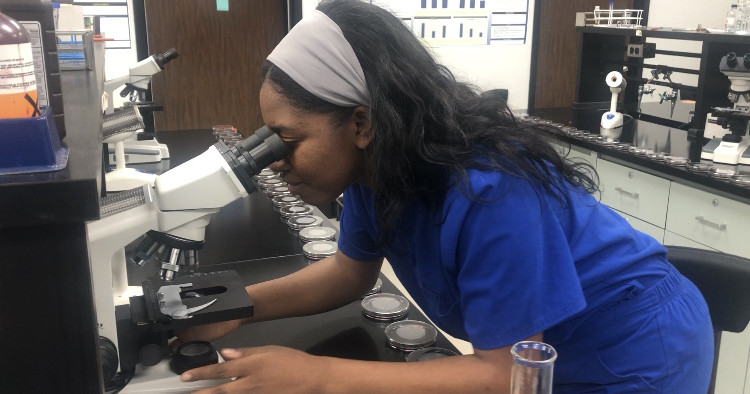
“I want to be someone that can implement different programs that can get students whatever they need, whatever their plans are, and however they plan to get there,” Joycelyn said. “I know how it is. I was a freshman once. I want to be available to whoever needs me.”
The way she decided to help those who may not know where to start is through the GOMA Co-op program at HudsonAlpha. Joycelyn works in Sara Cooper’s lab at HudsonAlpha, learning the ins and outs of ovarian and breast cancer research. The senior biology major wanted something to enhance her experience outside of a college laboratory, which may not have been possible without the program. “Because I did not have a lot of experience before working here, I was afraid I wouldn’t have the skills people are looking for. This definitely gave me the opportunity to get that experience.”
She knows how important those opportunities are but also how overwhelming it can be to get there. “I think being at an HBCU, sometimes you don’t really know about all of the opportunities you have,” Joycelyn said. “You have teachers telling you about internships, but sometimes you look at that internship board, and you start to doubt yourself. I felt that way, but I promise you can get to where you want to go.”
The GOMA Co-op program at HudsonAlpha shaped how Joycelyn will spend the rest of her time as college royalty. When it comes to life after graduation, she plans to do a year abroad teaching biology. But Joycelyn’s main goal right now is to encourage younger students to try new things, get out of their comfort zone, and keep reaching for their goals because, eventually, they will get what they’ve been aiming for.
“The worst thing that could happen is a no. I got 13 rejections before I got my yes, so just keep trying.”
The HBCU GOMA Co-op program builds a talent pipeline from historically black colleges and universities in Alabama to the state’s workforce. While it helps shape students’ futures from all over Alabama, it gives them skills that will translate far beyond the classroom. Curiosity, confidence, resourcefulness, and impactfulness are just four ways students at the HudsonAlpha Institute for Biotechnology are making a difference in their lives and their communities while leading the next generation of STEM professionals.
Special thanks to the Alabama Power Foundation for providing the funding to support this year’s GOMA internship program.

